Pound tumbles after inflation surprise
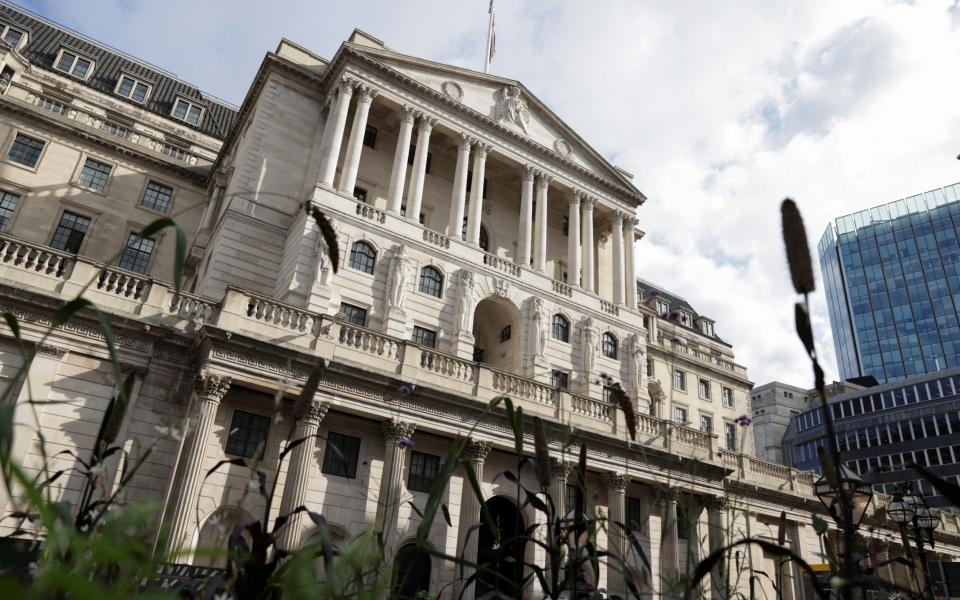
The pound has fallen by its largest margin since March after inflation declined more than economists expected.
Sterling has dropped 1pc toward $1.29 after hitting 15-month highs of more than $1.31 last Thursday.
It comes after official figures showed inflation in the UK fell to 7.9pc in June, which was down from 8.7pc in May and below economists’ predictions of a drop to 8.2pc.
It has prompted a dramatic day on markets, with traders cutting bets on the peak for interest rates to 5.75pc from 6.25pc on Tuesday.
That has in turn impacted the value of the pound and sent Government borrowing costs plummeting in a boost for mortgage holders.
Barclays strategist Emmanuel Cau said: “The strength in the pound was due to higher inflation pushing rates expectations up and growth expectations down.
“So today’s weaker-than-expected inflation print is arguably a relief, which should lift sentiment on the depressed domestic plays and rates plays.”
Samuel Tombs, chief UK economist at Pantheon Macroeconomics, called the figures “a watershed moment.”
He said: “We continue to think that the worst is over for UK households and that the MPC will not need to raise Bank Rate all the way to 6.25pc, as markets priced-in yesterday.”
06:47 PM BST
Signing off
That’s all from me, we’ll be back first thing tomorrow. I’ll leave you with this update from Jeremy Hunt, who believes that Britain can become the next Silicon Valley in the next decade...
7/8 In the coming decade, with the right policies, we can go further: become the world's next Silicon Valley, benefitting from the explosion these sectors are set to see. Not picking winners 1970s-style but being clear-eyed about the sectors where we have comparative advantage.
— Jeremy Hunt (@Jeremy_Hunt) July 19, 2023
06:41 PM BST
Severn Trent Water downplays fears of hosepipe ban
Severn Trent Water has downplayed fears of a hosepipe ban after claiming its reservoirs are ‘well filled’.
The British water company said that its reserves are 77pc full, which is 10pc higher than the same period last year.
Severn Trent, which supplies 4.6m households and businesses across the Midlands and Wales, said it is “well-positioned” to deal with the hot summer months.
It comes after South East Water imposed a temporary hosepipe ban across Kent and Sussex as prolonged hot weather and lack of rainfall placed pressure on the supplier’s reservoirs.
The decision came after thousands of households and businesses faced no tap water or low pressure last month.
Severn Water also confirmed that it remains on track to meet financial targets for the year.
06:20 PM BST
Mike Ashley’s Frasers raises stake in Asos to 13pc
Mike Ashley has raised his stake in Asos amid tensions between the Sports Direct billionaire and the struggling online fashion retailer’s biggest shareholder, retail editor Hannah Boland reports..
Mr Ashley’s Frasers Group has increased its voting rights in Asos to more than 13pc, new filings revealed on Wednesday, up from 10.6pc previously.
Danish retailer Bestseller, which is run by billionaire Anders Holch Povlsen, remains Asos’s largest shareholder.
The Telegraph revealed earlier this year that a row was brewing between the two billionaires over the Asos business, amid speculation about a possible takeover. It follows an earlier clash between Mr Ashley and Mr Holch Povlsen over Scotland’s oldest department store, Jenners.
Asos has been racing to overhaul its business after a slump in its share price. Shares are down around 63pc over the past year as shoppers shift away from online shopping after the end of the pandemic.
The turnaround is beginning to yield results, with Asos returning to profit and now making 30pc per order compared to last year.

06:07 PM BST
Microsoft promises Activision £4bn if takeover falls apart as deadline extended
Microsoft has promised to pay Activision up to $5bn (£3.9bn) if its bid to buy the company fails, as the pair fight to win approval from Britain’s competition watchdog.
Technology reporter Matthew Field reports:
The tech companies have agreed to extend the deadline for their planned $69bn mega merger to mid-October after missing the initial deadline on Tuesday.
As part of the new deal, Microsoft has promised to increase the termination fee for Activision from $3bn to as much as $4.5bn if a deal can’t be reached by the autumn.
In addition, Microsoft will pay Call of Duty-maker Activision an extra $500m for the Xbox rights to its games over two years should the deal fall apart.
The sweeteners from Microsoft come as it battles to keep the takeover alive. The company has defeated competition objections in the US but must still overcome the concerns of the UK’s Competition and Markets Authority (CMA).
The CMA blocked the deal in April over fears that the merger would give Xbox-make Microsoft power to block hit games such as Call of Duty from appearing on other services.
Here’s what Activision has agreed in return...
05:45 PM BST
Netflix subscribers to pay more for advert-free viewing
Netflix subscribers will have to pay £4 extra a month if they want to watch shows without adverts.
Personal finance reporter Madeleine Ross has the details:
The streaming service has axed its basic subscription, which cost £6.99 a month and allowed viewers to watch shows without adverts in standard definition on one screen, making it a popular option among people who lived alone.
Pricing changes mean new users will now have to pay £10.99 to enjoy commercial-free viewing on Netflix’s “Standard” service, which also allows for multiple screens simultaneously.
A “Premium” subscription is also available for £15.99 and offers Netflix customers the ability to watch shows on four screens at the same time in higher definition.
Fans of popular shows such as Bridgerton and The Witcher who are happy to sit through adverts can pay a reduced rate of £4.99 for Netflix’s “Standard with adverts” deal, although this option does not allow viewers to download shows to watch offline.
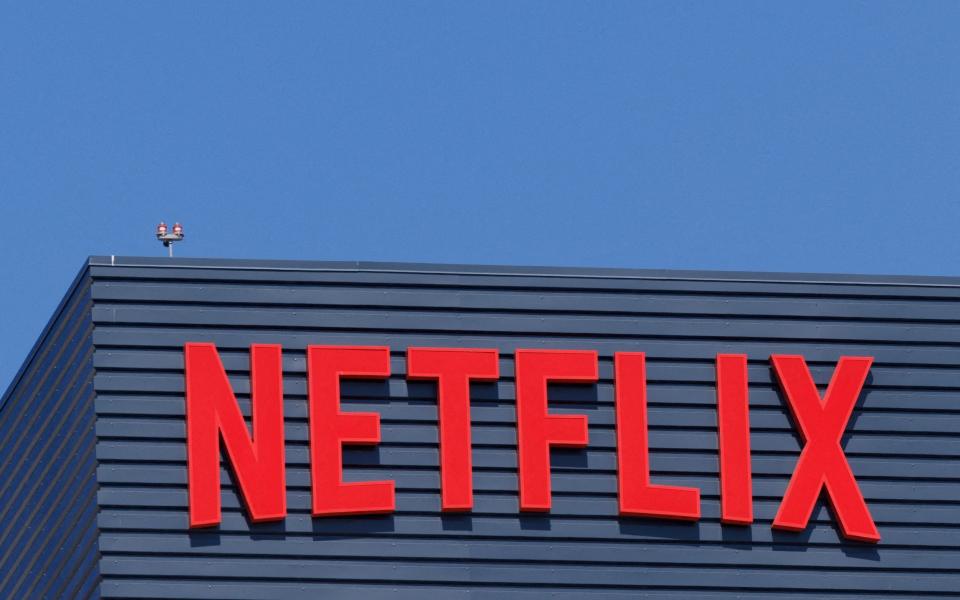
05:34 PM BST
Goldman Sachs' profits slump 60pc as property bets turn sour
A global downturn in commercial property and poorly timed bets on home improvement loans have left Goldman Sachs nursing a 60pc slump in profits.
My colleague Chris Price has the story:
The Wall Street giant reported one of its worst quarters under chief executive David Solomon as a dealmaking drought and trading downturn also hit revenues.
The bigger-than-expected drop in second quarter profits was driven by a $504m (£390m) writedown in the value of Goldman’s GreenSky business, which offers US homeowners loans to improve their properties.
The investment bank also took a $485m hit on real estate investments amid a global downturn in the value of office blocks and other commercial properties.
Goldman profits slumped to $1.1bn (£850m) for the three months to the end of June, which was below forecasts.
Return on equity, a key measure of profitability, slid to 4pc — the worst among the top US banks.
The quarterly profit slump marks the worst three month period since the second quarter of 2020, when Goldman was forced to set aside millions to cover a corruption scandal linked to Malaysian state fund 1MDB.
As well as struggles with its consumer lending business and losses on property investments, the bank was hit by a downturn in corporate deal making and a slowdown in trading.
M&A dropped by 44pc in the first six months of 2023, according to Bain. The consultancy blamed “macroeconomic and interest rate uncertainty”.
Goldman’s results contrast with major Wall Street rivals whose earnings beat expectations, including JPMorgan Chase and Morgan Stanley. Executives cited a resilient economy but cautioned that high borrowing costs will begin to weigh on loan demand later this year.
Goldman has been trying to sell GreenSky just over a year after buying the business for $1.7bn as part of a push into retail banking.
However, the Wall Street lender has abandoned that push in recent months, folding its consumer brand Marcus into its asset management business and selling off loans.
Chairman and chief executive Mr Solomon told analysts in April that GreenSky is a “good business” but the bank might not be the “best long-term holder” given its strategic priorities.
The about turn on GreenSky is one of the most visible signs of how dramatically management has backtracked on its retail banking strategy in the past year.
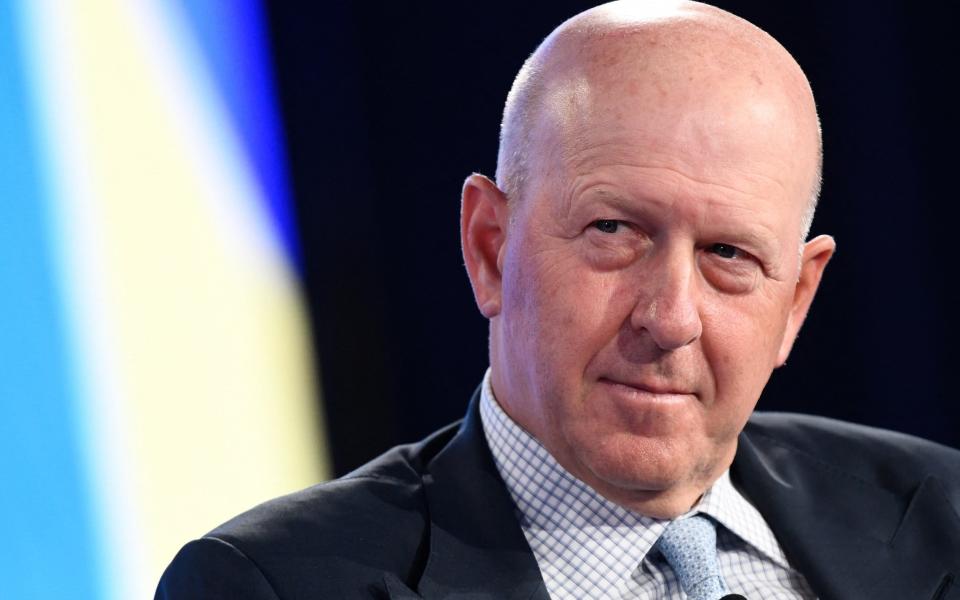
05:28 PM BST
Asda co-owner stonewalls MPs on fuel prices
Asda co-owner Mohsin Issa has rejected the CMA’s finding that the supermarket chain used volatile energy costs following the Ukraine war to “feather” fuel prices.
When asked by the Business and Trade Committee whether Asda saw volatile energy prices as an opportunity to increase profit margins, Mr Issa replied: “Absolutely not.”
The British billionaire also avoided answering questions on whether Asda deliberately increased their internal profit margin targets on fuel sales between 2019 and 2023, as found by the CMA.
“During that period our strategy did not change in terms of fuel pricing. Margin is an output of strategy, we more than invested that margin into food,” said Mr Issa. “We set the price and then others have an opportunity to undercut us.”
05:08 PM BST
Asda was slow to pass fuel price reductions to consumers, CMA tells MPs
Asda repeatedly told the UK’s competition watchdog that it had not changed its fuel pricing strategy, MPs have been told.
Dan Turnbull, director of markets at the Competition and Markets Authority (CMA), said that Asda consistently maintained its strategy of being the lowest cost provider in any particular area.
However, the CMA said it found there were two very significant changes to Asda’s pricing approach, including its internal profit margin targets.
Mr Turnbull explained: “So we found that between 2021 and 2023 they significantly increased their internal fuel margin targets on a pence per litre basis, and indeed by 2023 those pence per litre targets were three times what they’d been in 2019.
The CMA official also revealed that Asda made a decision in 2022 to “deliberately feather prices on fuel as they came down from the peak” following the Ukraine war, particularly in the volatile diesel market.
He said: “Asda told us that they saw an opportunity as the wholesale price fell to pass through reductions in the retail price more slowly than they previously would have done.
“And they said that they applied that over 100 petrol stations where they faced no direct competition from another supermarket in the local area.”
04:37 PM BST
FTSE 100 closes in the green
The FTSE 100 has closed up 1.8pc to 7,588.20, while the FTSE 250 midcap index has ended 3.78pc higher at 19,322.52.
Listed housebuilders enjoyed their their largest one-day gain since November 2008, climbing 7pc.
The FTSE 100 was particularly boosted by huge gains for Persimmon (share price up 8.29pc), Barratt Developments (7pc) and Taylor Wimpey (6.8pc) who have raised concerns about the impact of rate hikes on mortgages and the housing market.
03:51 PM BST
Rishi Sunak tight lipped on Tata gigafactory location
Rishi Sunak has declined to confirm where Tata’s £4bn battery gigafactory would be built in the UK, saying “that is a question for the company” and “they will make those announcements in due course”.
The Indian conglomerate is widely reported to have chosen Somerset but refused to confirm the location.
The Prime Minister also insisted that it was not taxpayer subsidies alone which persuaded Tata to built its battery plant in the UK, which will create thousands of jobs. He said:
When I was Chancellor, I set up the automotive transformation fund, which was always there to provide targeted investment in strategic industries where we thought it would make sense.
But what is crucial about an investment like this is it’s not just going to be about that, it’s going to be about the quality of the workforce that we have here, the quality of our infrastructure, the road and rail connections, the approach to regulation, the competitiveness of our tax regime, which we have changed to make it more attractive for businesses to invest.
03:30 PM BST
Handing over
I’m off now and will leave you with our desk night-owl Adam Mawardi, who will make sure you stay up-to-date into the evening.
Away from inflation, I’ll just flag to you some statistics from the US, where new home construction retreated in June after surging a month earlier.
Residential starts fell 8pc last month to a 1.4m annualised rate, according to government data.
Applications to build, a proxy for future construction, slipped 3.7pc to an annualized pace of 1.44m units. However, permits to build one-family homes increased to a one-year high.
The retrenchment in groundbreakings follows a surprise jump in the prior month and paints more of a picture of stabilisation in residential construction than renewed weakness.
Even with the decline, home starts are running at a pace that is above the pre-pandemic trend.
🇺🇸#Housing starts plunge 8% to 1.43mn in June
⚠️Big downward revisions
⚠️All regions lower
⚠️-8.1% y/y
🏠Single-family consolidating
🔻-7% m/m to 935k
🔻-7.4% y/y
🏙️Multi-fam still high pace
🔻-9.9% m/m to 499k
🔻-9.4% y/y
📄#Permits -3.7% to 1.44mn
✅1-Unit +2.2% pic.twitter.com/dKZ81t7Vb9— Gregory Daco (@GregDaco) July 19, 2023
03:15 PM BST
National Grid sells stake in gas network amid doubts over hydrogen heating
The National Grid has sold off more of Britain’s gas network to foreign investors just days after Grant Shapps raised doubts about plans to use the infrastructure for hydrogen heating.
Special correspondent Matt Oliver has the details:
A consortium led by Australian investment bank Macquarie on Wednesday said it was exercising an option to acquire another 20pc of the business now known as National Gas, taking its control to 80pc.
National Grid, which owns the remaining 20pc of the business, will bank £700m in the deal.
Macquarie and its partners also hope to acquire those shares as well, under an option agreement that will come due next summer.
The transaction comes amid debate over the future of Britain’s gas network, which currently pipes natural gas into millions of homes but will have to find a new purpose in the push towards “net zero” carbon emissions.
This graph illustrates the sources of heat in homes in England.
02:58 PM BST
Oil gains as Russian shipments fall
Oil has risen to trade around $80 a barrel in London as traders weighed signs of tightening in the global crude market against a shaky economic backdrop.
Brent crude added 1.4pc, having gained in the previous session as data showed that Russia’s crude shipments fell to a six-month low in the four weeks to July 16.
US-produced West Texas Intermediate has also risen 1.4pc toward $77.
The curbs suggest that Moscow is fulfilling a pledge with its partners in the Opec+ cartel to rein in supplies.
Carsten Fritsch, commodity analyst at Commerzbank, said:
It looks like the price weakness is behind us, and traders seem to recognize that the market will tighten significantly from this month due to supply cuts and improving demand.
But the prospect for recessions in the US and the eurozone combined with slower demand in China will provide headwinds.
02:42 PM BST
US markets rise at the open
Wall Street’s main indexes opened marginally higher as investors digested Goldman Sachs second-quarter results and assessed strong earnings from a number of smaller banks.
The Dow Jones Industrial Average rose 0.1pc at the open to 34,991.21.
The S&P 500 opened 0.2pc higher at 4,563.87, while the Nasdaq Composite gained 0.3pc to 14,398.53 at the opening bell.
02:20 PM BST
Gas prices increase as heatwave grips Europe
European natural gas prices have pushed upwards as a heatwave sweeps the continent.
Benchmark futures rose as much as 4.2pc after earlier declines, suggesting extreme temperatures continue to test the market’s ability to cope with higher demand to power air conditioning.
Europe has emerged from the worst of last year’s crisis with ample gas storage levels, providing a sense of security that it will manage to restock enough fuel ahead of next winter.
Facilities are already 82pc full, well above the seasonal average, while natural gas supplies from Norway continue to edge higher.
Still, the extreme heat has triggered wildfires from Greece to Switzerland, while Rome and Spain’s Catalonia region recorded their highest-ever temperatures, driving up demand for fuel to power cooling needs.
Dutch front-month futures, the continent’s benchmark, are trading near €28 per megawatt hour. The UK equivalent also traded higher.

02:00 PM BST
European power demand to hit 20-year low, says IEA
The shutdown of heavy industry is expected to send European demand for power to its lowest level in more than two decades in the wake of the war in Ukraine.
EU electricity demand is forecast to fall by 3pc this year, similar to the decrease recorded in 2022.
Europe’s energy-intensive industries have not yet recovered from last year’s production slump, according to the International Energy Agency (IEA), amid a 6pc year-on-year decline in total EU electricity demand during the first half of 2023.
The IEA said: “The competitiveness of European energy-intensive industry is threatened by high energy costs. There is no easy path forward.”
Electricity usage is also predicted to fall in the US and Japan, though the global picture will vary depending on changes in the economic outlook.
Electricity demand in the EU has been hit especially hard by the energy crisis & is poised to drop this year to levels last seen in 2002
The EU's energy-intensive industries have not yet recovered from last year’s production slump even as electricity & gas prices have come down pic.twitter.com/kSgmwqmY05— Fatih Birol (@fbirol) July 19, 2023
01:44 PM BST
Government 'taking the responsible decisions' to limit inflation
Downing Street said it was “encouraging” to see falls in both the headline and core rates of inflation.
The Prime Minister’s official spokesman said: “We are not complacent, we know that high prices are still hurting some families and businesses, but we are taking the responsible decisions on spending so we limit the pressure on the Bank to raise interest rates further.”
The spokesman said he would not be drawn on what actions the Bank of England, which is operationally independent, should take.
01:18 PM BST
Banks 'will have to give customers three months' notice of account closures'
British banks will have to give customers three months’ notice of account closures and provide an explanation of their decision under reforms, it has been reported.
The Treasury plans to force British lenders to be more transparent with customers following the controversy surrounding Nigel Farage after his bank account was closed over his political views, according to Sky News.
Today, the Prime Minister’s press secretary said it would be “incredibly concerning” if an individual’s bank account was closed because of their political views.
She said: “If the reports that we have seen today are true about the reasons for Nigel Farage and his bank account being closed down, that is obviously incredibly concerning and wrong.
“No-one should be barred from bank services for their political views.”
The Prime Minister’s official spokesman said it would be “unacceptable if financial services were being denied to anyone exercising their right to lawful free speech”.
Read the latest on this story in our politics live blog.
12:59 PM BST
Goldman Sachs profits tumble amid banking slump
Goldman Sachs profits plunged as the Wall Street giant notched one of its weakest quarters under chief executive David Solomon.
Earnings fell 58pc amid an investment-banking slump as well as real estate markdowns and a goodwill writedown in the consumer business, which houses the GreenSky lending business, which it plans to sell.
Return on equity, a key measure of profitability, slid to 4pc in the quarter — the worst among the top US banks.
The firm had been actively tempering expectations heading into the report, prompting analysts to slash their estimates for quarterly profit by almost half since mid-June. Shares of the company fell 1pc in premarket trading.
Goldman’s management has been working to smooth the firm’s sometimes volatile quarterly results, which featured big gains during the post-pandemic boom followed by a run of missed profitability goals.
Investors are looking to see whether the second quarter represents a trough for the New York-based company, with a steadier run of earnings gains ahead.
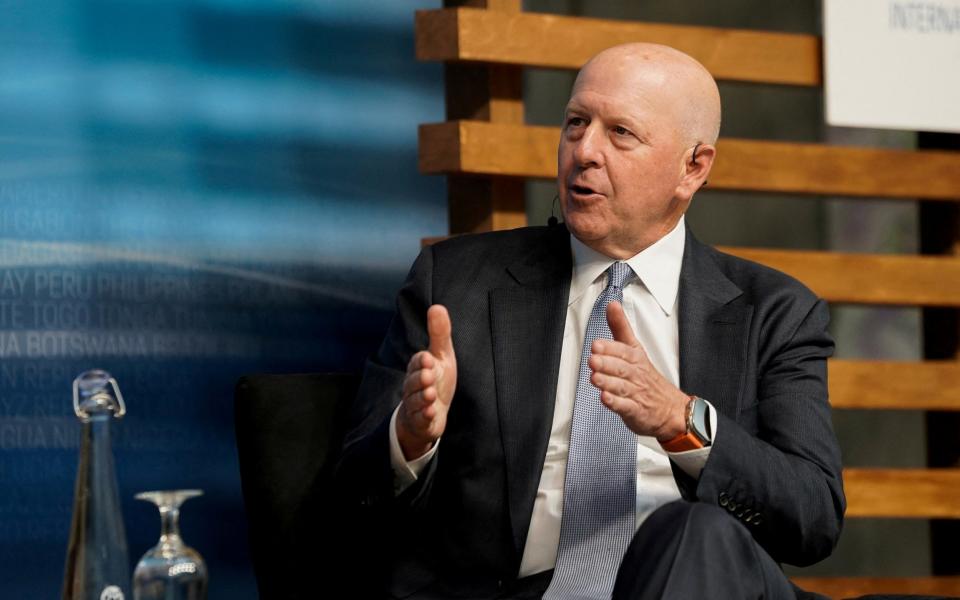
12:36 PM BST
‘Stupid’ AI won’t eradicate humanity, says Sir Nick Clegg
Artificial intelligence (AI) technology is too “stupid” to threaten humanity, Sir Nick Clegg has said, as Meta unveiled its rival to ChatGPT.
Senior technology reporter Matthew Field has the latest:
The former deputy prime minister, who is now Meta’s head of global affairs and communications, played down warnings about the threat of AI, saying that “existential warnings” relate to technologies that “don’t currently exist”.
His comments came as Meta, which owns Facebook and Instagram, said it would make the blueprints to its new AI available to businesses for free.
The company’s AI chatbot, called Llama, will be “open source”, meaning organisations are able to freely inspect or copy its data for their own purposes.
Sir Nick told BBC Radio 4’s Today programme: “My view is that the hype has somewhat run ahead of the technology.”
This chart shows the projected impact of AI.
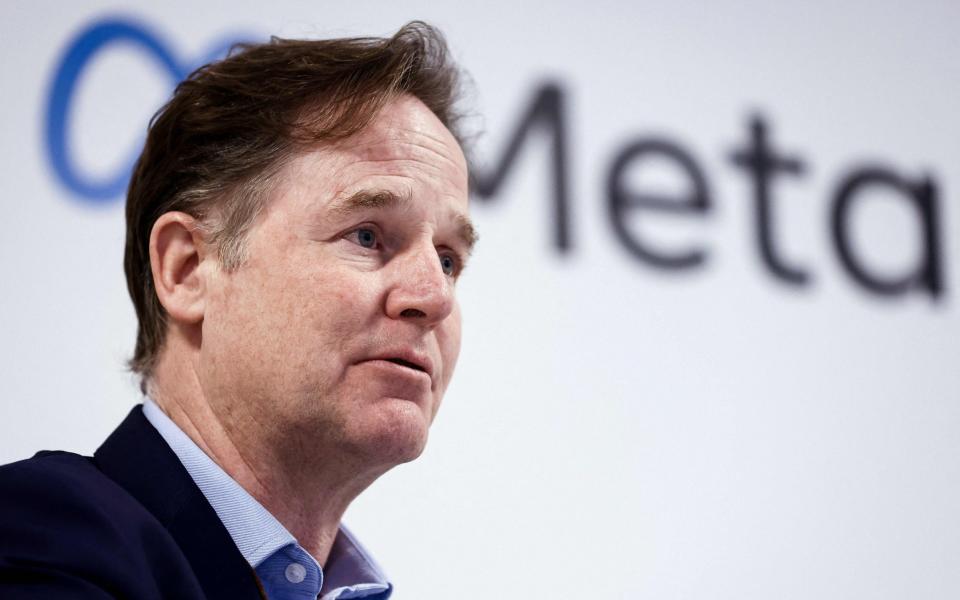
12:21 PM BST
Wagamama owner shrugs off cost-of-living crisis
Wagamama owner The Restaurant Group (TRG) has shrugged off the consumer cost-of-living crunch to reveal “very encouraging” trading so far this year.
The hospitality business saw shares jump higher in early trading after it also hailed strong progress on its cost-savings efforts, which include the previously announced closure of around 35 venues across its leisure brands.
Casual dining brands have faced significant pressure over the past year from sharp rises in food costs and energy bills as well as its customers facing higher household bills.
Nevertheless, TRG said on Wednesday that Wagamama has reported a 5pc like-for-like increase in total sales over the 28 weeks to July 16.
Meanwhile, its pub business reported a 9pc increase and its leisure business, which includes Frankie & Benny’s, saw a 4pc decline.
The update comes after pressure from activist investor Oasis Management, which has built an almost 15pc stake in the company, over its performance and recent losses.
Shares in TRG were 4.9pc higher at 40.9p in early trading.
12:06 PM BST
Top US economist quits Brussels job after Macron backlash
A senior US economist has turned down a top Brussels job after a backlash from Emmanuel Macron and other European politicians who objected to her nationality.
Economics reporter Melissa Lawford has the details:
Yale professor Fiona Scott Morton has declined to take up the position of chief economist in the European Union’s competition directorate following a week of criticism of her appointment.
Prof Morton’s appointment would have marked the first time a non-EU citizen had taken such a senior role in the European Commission and critics argued that Prof Morton could be biassed towards US companies.
In a letter to Margrethe Vestager, the European Commissioner for Competition, Prof Morton said on Wednesday: “Given the controversy that has arisen because of the selection of a non-European to fill this position, and the importance that the Directorate General has the full backing of the European Union as it enforces, I have determined that the best course of action is for me to withdraw and not take up the Chief Economist position.”
The letter came hours after Mr Macron called her appointment “dubious”. Read why.
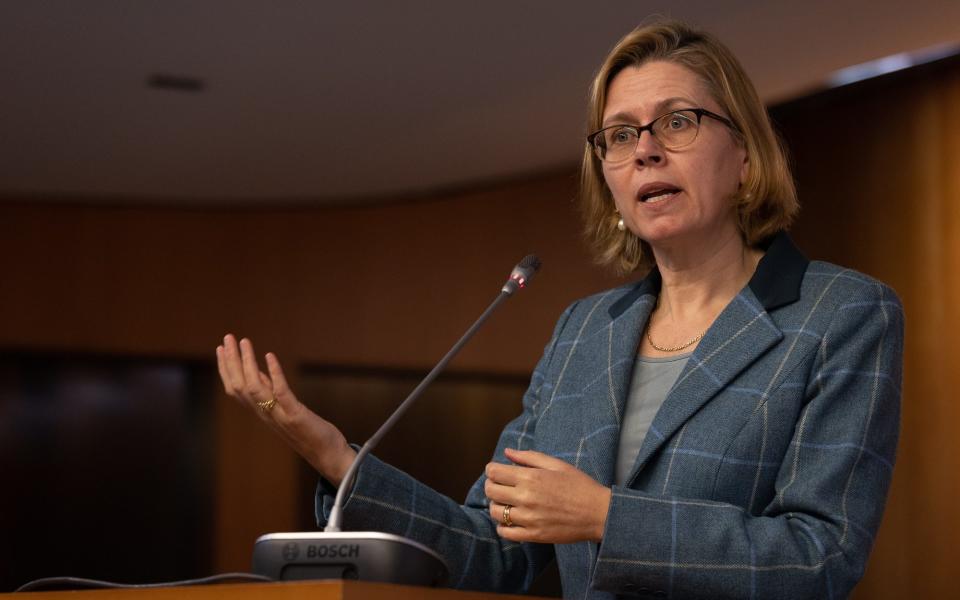
11:52 AM BST
Wall Street poised to inch upwards
US stock indexes are on course to creep higher later, with all eyes on second-quarter results from Tesla, Netflix and Goldman Sachs.
Upbeat bank earnings helped the Dow Jones Industrial Average post its longest winning streak in two years on Tuesday.
Goldman Sachs, the last of the big banks to post results, inched up 0.3pc in premarket trading.
Big US lenders rallied on Tuesday after they said higher interest rates had helped boost profits in the second quarter.
Kim Forrest, chief investment officer at Bokeh Capital Partners: “Banks in general had very low expectations but the ones reporting (on Tuesday) largely beat these expectations.”
M&T Bank, Citizens Financial, US Bancorp , Zions Bancorp and Discover Financial also report today.
Meanwhile, Tesla has slipped 0.3pc in premarket trading ahead of results expected after the bell. Its strategy to boost sales through price cuts is likely to have powered its strongest revenue growth in five quarters while dragging down margins to a three-year low in the three months to June.
Futures contracts on the Dow Jones Industrial Average were last up 0.2pc, the S&P 500 was flat and Nasdaq 100 had gained 0.1pc.
11:25 AM BST
Broadcom's £53m VMware takeover given green light
Chip maker Broadcom’s $69bn (£53.4bn) deal to buy VMware has been provisionally cleared by regulators, who said it would not weaken competition in the supply of critical computer server products.
The Competition and Markets Authority (CMA) in March raised concerns that the deal could make servers more expensive, prompting an in-depth investigation.
It said: “After examining the evidence gathered from Broadcom, VMware and other interested parties, an independent CMA panel has provisionally found the deal would not substantially reduce competition in the supply of server hardware components in the UK.”
The EU approved the deal a week ago.
The CMA said it consult on its provisional view before issuing a final report by September 12.

11:14 AM BST
Eurozone 'likely remained in recession' in second quarter, say economists
The eurozone will most likely have remained in recession throughout the first half of this year, economists have predicted, as the single currency area’s underlying inflation figure was revised upward.
Construction and retail data for May, as well as factory output figures, were likely “not enough to reverse the steep drop in March,” according to Capital Economics.
It predicts that GDP across the eurozone fell by 0.1pc or 0.2pc in the second quarter, in contrast to the consensus forecast that it expanded by 0.2pc.
Deputy chief eurozone economist Jack Allen-Reynolds said:
The latest data suggest that the eurozone remained in recession in Q2. We think that the economy will continue to contract in the second half of the year as the impact of tighter monetary policy feeds through.
Admittedly, these three sectors together [construction, retail and industrial production] account for only around a third of total economic activity. Some other sectors, such as those related to tourism, might have performed better.
But that was also true in Q4 2022 and Q1 2023, when GDP contracted. And in those quarters, the available monthly activity data were stronger than they have been so far in Q2.
What’s more, the business surveys weakened in June, suggesting that the official data are more likely to show declines than increases in the final month of the quarter.
10:59 AM BST
Mortgage lenders should 'move away from sudden rate hikes'
The bigger-than-expected slowdown in inflation has fuelled hopes that the upward pressure on mortgage rates could start to ease.
The Bank of England has been raising interest rates as a tool to quell stubbornly high inflation but the latest figures will raise hopes that rates do not need to climb as high as feared.
According to Moneyfacts, the average two-year fixed-rate homeowner mortgage rate on the market on Wednesday is 6.81pc, up from 6.78pc on Tuesday.
The average five-year fixed residential mortgage rate is 6.33pc, up from an 6.3pc on Tuesday.
Andrew Montlake, managing director of mortgage brokers Coreco, said:
I suspect we will see a slight reprieve as swap rates (which lenders use to price their mortgages) ease a touch with the prospect that we are now closer to the top of the interest cycle than thought a few weeks ago.
The Bank of England must now exercise some restraint.
Whilst this may not yet mean we see a wholesale fall in mortgage rates, lenders should at least now move away from sudden rate hikes and also enjoy a period of calm reflection.
10:45 AM BST
FTSE 250 posts strongest gain in nearly six months
The FTSE 250 is enjoying its strongest day in nearly six months after inflation came in lower than expected in a boost for the British economy.
The index of midcap companies is more focused on the UK than the export-heavy FTSE 100.
Rate-sensitive sectors such as homebuilders and private equity firms have performed best, along with those exposed to consumer spending power, such as travel stocks.
Great Portland Estates was up 8.6pc, Redrow gained 8.1pc, Derwent London was up 7.9pc and Crest Nicholson had jumped 7.5pc.
Other strong gainers included startup investor Molten Ventures, up 7.7pc, media company Future, up 7.5pc, payments firm WAG Payment Solutions, up 6.6pc and insurer Direct Line, which has gained 5.1pc.
The FTSE 250 has climbed as much as 3.2pc to hit its highest level in a month, making its strongest move in a single day since February.
10:30 AM BST
Record rise for private rents
Rents paid by private tenants in the UK increased by 5.1pc in the year to June — the largest rise since official records began in 2016.
London rents alone jumped by 5.3pc, according to the Office for National Statistics (ONS), up from 5.1pc a month earlier and the highest since September 2012.
The figures emphasise the headwinds facing the UK housing market, as interest rates keep rising and add to mortgage costs.
Those trends are forcing landlords to bump up their rents, while deterring buyers.
The ONS also said house prices recorded by the Land Registry increased by just 1.9pc in the year to May to an average of £286,000, slower than the 3.2pc gain recorded in April.
Private rental prices paid by tenants in the UK rose by 5.1% in the 12 months to June 2023.
This is up from 5.0% in the 12 months to May 2023.
➡ https://t.co/z0gj8CfaxC pic.twitter.com/abpqNXQKHu— Office for National Statistics (ONS) (@ONS) July 19, 2023
10:10 AM BST
Eurozone core inflation higher than first estimated
Underlying inflation in the eurozone accelerated more than initially reported in June, cementing expectations of an interest-rate increase next week.
Core consumer prices, the key measure of price gains for the European Central Bank (ECB), rose 5.5pc from a year earlier, statistics agency Eurostat said.
The figure, which strips out volatile elements like food and energy, compares with a preliminary estimate of 5.4pc and a reading of 5.3pc in May.
The main gauge of inflation was confirmed at 5.5pc — the lowest level since before Russia invaded Ukraine.
With headline inflation now having almost halved since its 10.6pc peak in October, officials have shifted focus to core price rises, which have proving more stubborn.
Earlier this week Dutch central bank chief Klaas Knot, a rate setter for the ECB, said core inflation appears to have “plateaued,” describing any action beyond July as “a possibility but by no means a certainty.”
Euro area annual #inflation at 5.5% in June 2023, down from 6.1% in May https://t.co/64UeInSVjV pic.twitter.com/dy1UQWRo7W
— EU_Eurostat (@EU_Eurostat) July 19, 2023
10:05 AM BST
House prices down £7,000 since September peak
Average UK house prices increased by 1.9pc in the 12 months to May, slowing from 3.2pc in April, according to official figures.
The average UK house price was £286,000 in May 2023, which is £6,000 higher than 12 months earlier but £7,000 below a recent peak in September, the Office for National Statistics said.
Average house prices increased over the 12 months to May to £304,000 in England (1.7pc annual growth), £213,000 in Wales (1.8pc), £193,000 in Scotland (3.2pc) and £172,000 in Northern Ireland (5pc).
UK average house prices increased by 1.9% in the 12 months to May 2023.
This is down from 3.2% in April 2023.
➡ https://t.co/oK4WnXvvbS pic.twitter.com/pF0InCdV9f— Office for National Statistics (ONS) (@ONS) July 19, 2023
09:59 AM BST
'Long way to go' on inflation, says Hunt
Chancellor Jeremy Hunt stressed the need to “stick to the plan” to get inflation under control.
Asked if the decline in inflation means the Bank of England should ease up on interest rate hikes, Mr Hunt said:
What we have seen is the Bank has taken very difficult decisions and the Government has taken very difficult decisions in the Autumn Statement to make sure that we really do start to bring down inflation.
We are seeing the first fruits of that but there’s a long way to go and we need to remember that families are still feeling a lot of pressure with very high food price inflation.
Although fuel prices have come down, they’re still significantly higher than they were a few years ago.
And so we need to stick to the plan to halve inflation, to bring it back even beyond that to the Bank of England’s target rate of 2pc.
But we can see from other countries, if we do that, we will succeed. And we can put this very difficult period for households behind us.
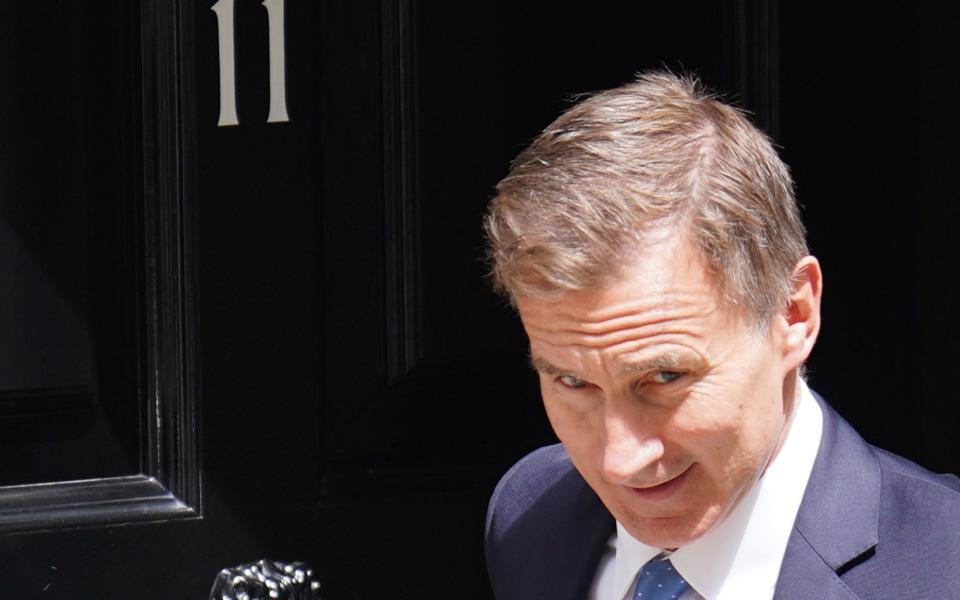
09:49 AM BST
Chechen warlord Ramzan Kadyrov’s ‘dear’ nephew handed top job by Putin at seized Evian owner
The 32-year-old nephew of Chechen warlord Ramzan Kadyrov has been handed control of the Russian operations of Danone, after the Kremlin seized control of the French food maker’s local business.
Yakub Zakriev, a deputy prime minister of Chechnya and its agriculture minister, has been named general director of Danone Russia, official documents show.
Mr Zakriev is the son of the elder sister of Chechen leader Ramzan Kadyrov, who has referred to his relative as “dear nephew” on social media.
Mr Kadyrov is a close ally of Russian President Vladimir Putin and has publicly supported the war in Ukraine.
The appointment of the regional warlord’s nephew to run Danone Russia comes after Putin signed a decree on Sunday officially seizing control of the business, which owns brands such as Alpro, Actimel, and Evian.
The Kremlin has been taking over the local operations of many Western businesses that have chosen to flee the country following the invasion of Ukraine.
Read how Putin’s allies have been jockeying to take control of the most lucrative assets.

09:40 AM BST
Hunt dodges question on size of subsidies for Tata factory
Chancellor Jeremy Hunt would not be drawn on the scale of the taxpayer subsidies being offered to secure the Tata investment. He said:
We are having discussions with lots of companies and we are in competition with companies all over the world for these big investments.
Obviously, those discussions are commercially sensitive.
But what you can see from today’s decision is that the industries that are going to grow the fastest this century - and of course electric vehicles are one of those sectors - are the sectors that we are fundamentally very strong in.
People want to invest in the UK because we have a very skilled workforce, we have brilliant universities and we have some of the most productive car plants in Europe.
09:31 AM BST
Gigafactory must be made with UK steel, says Unite boss
Unite general secretary Sharon Graham said Tata’s decision to build a £4bn battery gigafactory in the UK is “a very welcome development” but highlighted Britain’s “last minute.com approach to our industrial strategy”. She said:
The US and Europe have clear, proactive plans for jobs and investment. We cannot continually lag behind.
The Government must seize on today’s good news to put forward a strategic long-term industrial plan that will be enacted as soon as possible.
As part of a comprehensive industrial strategy, the Government must ensure the gigafactory is constructed with UK steel.
There must also be reform of the sky-high energy business costs that are proving to be a serious risk to the future of manufacturing in the UK.
09:24 AM BST
Tata £4bn factory 'testatment' to UK car industry, says PM
After Tata Group confirmed plans to invest £4bn to build a battery plant in the UK, Rishi Sunak said:
Tata Group’s multi-billion-pound investment in a new battery factory in the UK is testament to the strength of our car manufacturing industry and its skilled workers.
With the global transition to zero emission vehicles well underway, this will help grow our economy by driving forward our lead in battery technology whilst creating as many as 4,000 jobs, and thousands more in the supply chain.
We can be incredibly proud that Britain has been chosen as home to Tata Group’s first gigafactory outside India, securing our place as one of the most attractive places to build electric vehicles.
09:14 AM BST
'Close call' on size of next Bank of England interest rate rise
Economist James Smith at ING said it will be a “close call” whether the Bank of England votes for a 0.25 or 0.5 percentage point interest rate rise in August. He said:
Is this enough to convince the Bank of England to opt for a 25 basis point rate hike in August?
We think it probably will - but it’s going to be a close call.
The Bank will also be looking at the recent wage data, which was stronger than expected but came alongside figures showing a renewed cooling in the jobs market and improvements in worker supply.
09:03 AM BST
Tata to bring 4,000 jobs to UK with £4bn battery plant
The Indian owner of Jaguar Land Rover said it plans to build a £4bn battery factory in the UK - a move the Government says will bring around 4,000 jobs.
The plant - widely reported to be set for Somerset - will become one of Europe’s largest battery cell manufacturing sites when it starts producing in 2026, Tata Sons said on Wednesday.
It will produce about 40 gigawatt hours of battery cells every year. The Government said that is enough to provide about half the battery production the UK will need by 2030 according to the Faraday Institution.
The Government said it stepped in with subsidies to entice Tata Sons, which owns Tata Group, to build the plant in the UK. It did not say how much money it promised.
Energy Security Secretary Grant Shapps said: “The exact numbers on this will come out in the normal way. Because of the commercial sensitivities, they have to be released in the usual way.”
Tata Sons chairman Natarajan Chandrasekaran said: “Our multi-billion-pound investment will bring state-of-the-art technology to the country, helping to power the automotive sector’s transition to electric mobility, anchored by our own business, JLR.”
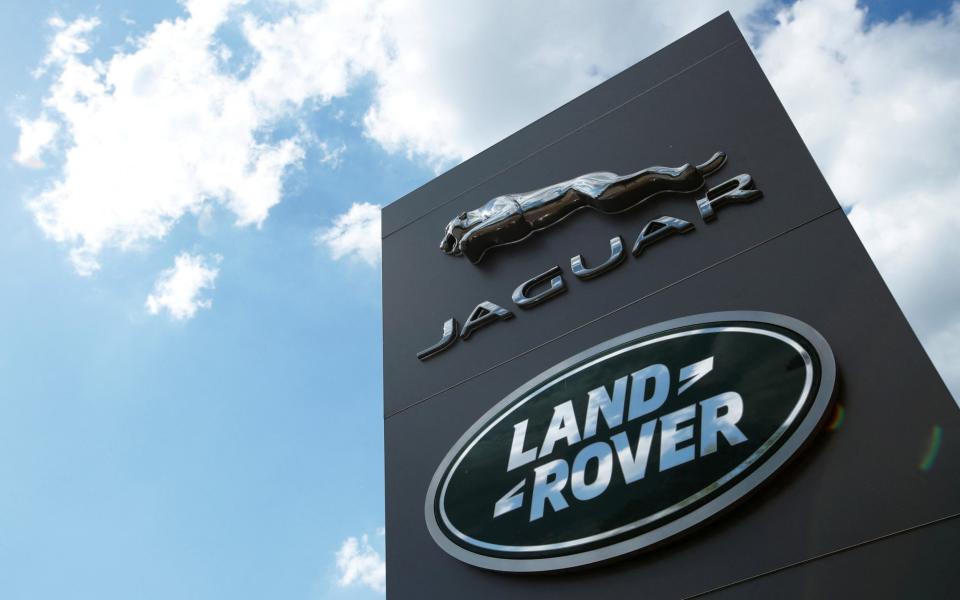
08:47 AM BST
FTSE 100 surges as pound weakens
Stocks have risen in a broad-based rally after inflation eased more than expected, with a weaker pound pushing the exporter-heavy FTSE 100 to a more than two-week high.
The UK’s benchmark blue-chip index rose 1.2pc, while the more domestically focussed FTSE 250 midcap index has added 2.4pc.
The pound weakened after inflation fell more than expected in June to its slowest in more than a year at 7.9pc, below expectations of 8.2pc.
Rate-sensitive shares in property, real estate investment trusts and homebuilders have gained between 5.3pc and 6.5pc.
Hargreaves Lansdown added 5pc after the investment platform reported higher net new business and assets under administration in the fourth quarter.
Aston Martin Lagonda gained as much as 6.1pc after Goldman Sachs upgraded the luxury automaker to “buy” from “neutral”.
Antofagasta has fallen 2.1pc after the Chilean miner lowered its full-year copper output forecast.
08:41 AM BST
Pound extends slump as interest rates expected to peak lower
The pound has extended losses, falling as much as 0.8pc to a one-week low of $1.2931 and hitting its weakest since late May against the euro.
Rishi Mishra, an analyst at Futures First Canada, said the fall in inflation to 7.9pc was a “pleasant number” for the Bank of England as markets cut their expectations for the peak of interest rates.
He said: “The direction of travel is right and I think the market will shift the terminal rate closer toward 5.75pc.”
08:31 AM BST
Gucci shares climb as boss Bizzarri ousted
Away from inflation for a moment, Gucci’s chief executive is leaving as the underperforming luxury group faces pressure from an activist investor to turn around performance.
Marco Bizzarri will leave Gucci in September, French luxury owner Kering announced, after eight years running the Italian label.
The change at the top comes after Kering was targeted by Bluebell Capital Partners, the activist that has led high-profile campaigns at GSK and Danone. Bluebell has specifically pushed for improvements at Gucci, Bloomberg reported.
Gucci accounts for around two thirds of profits at Kering, which also owns Balenciaga and Saint Laurent. However, the brand has failed to capitalise on a boom in demand for luxury goods in recent years. Kering’s share price has stagnated whilst rivals have seen their value surge.
Its previous creative director, Alessandro Michele, left in November and was replaced by Sabato de Sarno, who is scheduled to unveil his first collection for the brand in September.
Jean-Francois Palus, currently group managing director, will lead the brand for a transitional period.
Mr Palus, described by Kering chief executive Francois-Henri Pinault in the statement as his right-hand man and daily sparring partner, will focus on strengthening Gucci’s teams and operations to revive the brand’s momentum.
Mr Palus will relinquish his position on Paris-based Kering’s board and relocate to Milan.
Kering rose more than 7pc on news of Mr Bizzarri’s departure.
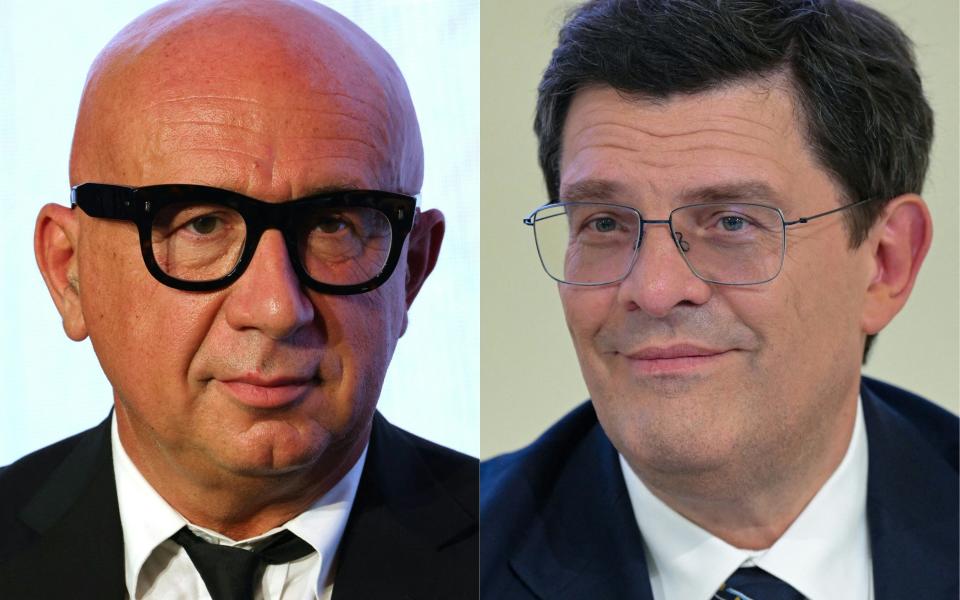
08:24 AM BST
Gilt yields plummet as inflation falls
Government borrowing costs have fallen by the largest margin since March as data showed inflation fell more than expected in Britain last month.
The yield on two-year UK gilts has plummeted as much as 30 basis points and stands at 4.75pc.
The coupon on benchmark 10-year Government bonds has dropped 13 basis points to 4.19pc.
The bond markets are a key factor in how lenders determine mortgage costs.
Now we're talking! https://t.co/VWGYHMuZXh
— Claus Vistesen (@ClausVistesen) July 19, 2023
08:13 AM BST
Traders expect interest rates to peak at 5.75pc
While the bigger-than-expected fall is likely to feed through to mortgage rates in the coming weeks, economists added it may not be enough for Bank policymakers to pause interest rate rises.
Economics editor Szu Ping Chan has the latest:
Officials have rifted rates 13 times since December 2021 to 5pc. While many analysts are now ruling out another half a per cent hike in August to tame inflation, traders still expect the base rate to peak at around 5.75pc.
However, this is dramatically down from rate expectations of 6.25pc predicted a couple of weeks ago.
Yael Selfin, chief economist at KPMG, said the Bank “is unlikely to substantially change its hawkish policy stance as inflation continues to run significantly above target” as she noted that even in the Bank’s predictions inflation would not ease back to its 2pc target until 2025.
She added: “We expect inflation to average 7.5pc this year before falling to 3pc in 2024.”
08:03 AM BST
FTSE 100 rises as inflation eases
The FTSE 100 has gained after the open as data showed inflation fell to its lowest level since March last year.
The blue-chip index jumped 0.8pc to 7,515.09 while the midcap FTSE 250, which is more focused on the UK economy, leapt by 3.2pc to 18,972.36.
07:57 AM BST
'Dramatic falls' in costs for factories to ease inflation, says ONS economist
Mr Fitzner added that more relief for consumers was on the way, with prices paid by businesses for raw materials and at the factory gate seeing some “very big falls”, writes Szu Ping Chan.
Prices paid by businesses for materials fell 2.7pcin the year to June, down from a peak of 24.5pc in what Mr Fizner described as “ really dramatic falls”.
He told the BBC: “Those are starting to flow through the factory gate which was virtually flat in the latest month. And typically producer prices lead consumer prices by three to four months.
“So certainly if you look at the pipeline, that looks encouraging.”
In the year to June 2023:
▪️ the cost of raw materials fell by 2.7%, down from a rise of 0.4%
▪️ the cost of goods leaving factories rose 0.1%, down from a rise of 2.7%
➡️ https://t.co/8MxykUmzxq pic.twitter.com/3NaNFjAYmu— Office for National Statistics (ONS) (@ONS) July 19, 2023
07:54 AM BST
Energy price cap kept inflation high, says ONS economist
Grant Fitzner, the ONS’s chief economist, partly blamed the UK’s energy price cap for keeping headline inflation high relative to other countries.
Economics editor Szu Ping Chan has the latest:
Ofgem’s price cap on unit energy costs changes each quarter, and fell from £2,500 to £2,074 in July.
Mr Fitzner told the BBC: “If you look specifically at energy prices ... in most other countries when energy prices change, electricity and gas prices paid by consumers change.
“In the UK, they used to adjust every six months and now every quarter and that builds a lag into those price adjustments which means it can often take a month or two longer for changes in market energy prices to flow through to consumers.”
By comparison, inflation in Germany currently stands at 6.8pc, while in France June’s headline rate eased to 5.3pc.
However, Mr Fitzner suggested that changes to the July price cap will help to drive the headline inflation rate even lower.
07:47 AM BST
'You could almost hear the sigh of relief at the Bank of England'
As core inflation fell to 6.9pc from 7.1pc, Credit Agricole’s head of G-10 currency research Valentin Marinov said:
You could almost hear the sigh of relief at the Bank of England.
As a minimum, the UK rates investors could reconsider their expectations of a 50bps hike in August and may even reassess the expectation of 6pc terminal rate.
07:40 AM BST
Putin exiting grain deal 'could push some food prices back up'
Food inflation may have fallen from 18.3pc in May to 17.3pc in June, but the retail industry has warned supply chains remained volatile and Vladimir Putin’s decision to pull out of the Black Sea grain supply agreement in Ukraine could push up prices.
Helen Dickinson, chief executive of the British Retail Consortium, said:
Efforts by retailers to curb price rises and reduce inflation appear to be paying off as inflation rates for food fell for the third month in a row.
Prices for cheese, fruit and fish all dropped as lower commodity costs and cheaper energy prices filtered through to customers.
There were also drops for many non-food items such as children’s clothing, household textiles and domestic appliances, boosted by an increase in summer discounting.
However, supply chains remain volatile: Russia’s decision to pull out of the Black Sea grain initiative could increase costs for some staples in the future.
07:35 AM BST
Food price inflation looks to have peaked, says PwC
Food price inflation eased to 17.4pc last month, which is down from 18.4pc in May and from a recent high of 19.2pc in March, which was the highest annual rate seen for over 45 years.
The largest downward contribution came from the milk, cheese and eggs category, with the annual rate easing to 22.8pc, from 27.4pc in May.
Lisa Hooker, industry leader for consumer markets at PwC, said:
After the disappointment of more persistent than expected inflation in May, June’s reduction in headline CPI from 8.7pc to 7.9pc is a relief for consumers and industry alike.
This was widely trailed - although nonetheless welcome - as a result of lapping the one year anniversary of the biggest price rises in energy and petrol caused by the Ukraine conflict.
It’s for this reason that we expect the good news to continue, with gradually lower inflation through the summer and autumn.
In particular, today’s numbers echo industry data from earlier this week suggesting that food price inflation has peaked, and that the rate of reduction may be starting to accelerate.
Shoppers are seeing the benefit of this in their weekly grocery shopping, as more supermarkets announce price cuts, particularly on key staples and basics such as milk, cheese and eggs.
07:26 AM BST
Inflation still higher than international peers, says Reeves
After inflation fell to 7.9pc in June, shadow chancellor Rachel Reeves said:
Inflation has been persistently high and remains higher than our international peers. This is becoming a hallmark of Tory economic failure.
Today’s numbers confirm what families across the country already know - that prices are still going up at staggering rates and that they’re bearing the brunt of those costs.
There may be global shocks - but Britain is so exposed to those because of Tory economic failure that has led to a severe lack of security in our economy.
Only Labour has the plans Britain needs to put our economy on a more secure path - so that families are better off and so we can grab hold of the opportunities of the future.
07:22 AM BST
Pound drops as markets cut interest rate expectations
The pound has fallen 0.7pc after data showed inflation falling more than economists expected.
Sterling is heading back toward $1.29 as traders cut bets on the peak for interest rates.
Markets are now forecasting a peak of 6pc in March next year, having expected a peak of 6.25pc before the figures were released.
07:15 AM BST
'We aren't complacent', insists Hunt
As inflation fell to 7.9pc, Chancellor Jeremy Hunt said:
Inflation is falling and stands at its lowest level since last March; but we aren’t complacent and know that high prices are still a huge worry for families and businesses.
The best and only way we can ease this pressure and get our economy growing again is by sticking to the plan to halve inflation this year.
07:14 AM BST
Drop in price of motor fuel eases inflation
After publishing the latest inflation data, the Office for National Statistics’ chief economist Grant Fitzner said:
Inflation slowed substantially to its lowest annual rate since March 2022, driven by price drops for motor fuels.
Meanwhile, core inflation also fell back after hitting a 30-year high in May.
Food price inflation eased slightly this month, although it remains at very high levels.
Although costs facing manufacturers remain elevated, especially for construction materials and food items, the pace of growth has fallen across the last year with the overall cost of raw materials falling for the first time since late 2020.
07:07 AM BST
Inflation falls but still nearly four times Bank of England target
Inflation fell more than expected in Britain last month, easing pressure on the Bank of England to push interest rates higher for longer.
The consumer prices index fell to 7.9pc in June, according to the Office for National Statistics, which was down from 8.7pc in May and below economists’ predictions of a drop to 8.2pc.
However, the figure remains nearly four times the Bank of England’s target of 2pc.
Nevertheless, policymakers will have been relieved by the so-called core inflation data ahead of their August 3 meeting.
The figure - which excludes the price of energy, food, alcohol and tobacco - which fell to 6.9pc in June, down from 7.1pc the previous month and below economists expectations that it would remain unchanged.
The Prime Minister has made halving consumer prices index inflation to around 5.3pc by the end of 2023 of his key priorities, but admitted it is “taking longer than any of us would like” to bring it down.
The data signals an easing of economic pain for borrowers after the Bank of England has delivered 13 consecutive increases since late 2021.
Annual inflation slowed in June 2023.
▪️ Consumer Prices Index including owner occupiers’ housing costs (CPIH) rose by 7.3% in the 12 months to June 2023, down from 7.9% in May
▪️ Consumer Prices Index (CPI) rose by 7.9%, down from 8.7% in May
➡️ https://t.co/cPUYOHcBiw pic.twitter.com/hDD1Q2AiJb— Office for National Statistics (ONS) (@ONS) July 19, 2023
07:01 AM BST
Good morning
Thanks for joining us. Inflation fell last month, according to the Office for National Statistics.
The consumer prices index stood at 7.9pc in June, down from 8.7pc in May.
5 things to start your day
1) Jaguar Land Rover chooses UK over Spain for battery gigafactory | Britain wins race for flagship battery plant in boost for Rishi Sunak
2) Ocado admits disappointment in M&S venture as tensions rise | Online grocer says that joint venture is ‘not where we wanted it to be’
3) Britain braces for potentially ‘deeply alarming’ inflation figures | Households are bracing for inflation figures which economists predict will fall to their lowest level since March last year.
4) Hong Kong billionaire bids for ownership of Britain’s offshore wind cable network | Consortium backed by one of Asia’s richest men enters race for crucial energy network
5) Bank of England staff receive £25m in bonuses despite Bailey ‘pay restraint’ warnings | Payouts revealed as Bank prepares to announce latest inflation figures
What happened overnight
Asia’s stock markets were mixed with growth concerns dragging on China’s equities.
However, shares rose in Japan and Australia after healthy US company earnings and retail data bolstered hopes the world’s biggest economy could avoid a recession.
MSCI’s broadest index of Asia-Pacific shares outside Japan was dragged 0.6pc lower by a 1.2pc drop for the Hang Seng. It has fallen daily since China’s growth data on Monday underscored the country’s faltering pandemic recovery.
Japan’s Nikkei rose 0.9pc and touched a two-week peak.
Wall Street stocks advanced on Tuesday as upbeat earnings on Wall Street and retail sales bolstered expectations that the Federal Reserve will hike interest rates next week.
The Dow Jones Industrial Average finished up 1.1pc at 34,951.93 and is on track for its longest streak of daily gains in more than two years.
The broad-based S&P 500 advanced 0.7pc to 4,554.98, while the tech-rich Nasdaq Composite Index gained 0.8pc to 14,353.64.
The yield on the benchmark10-year US Treasury slipped 0.2 basis points at 3.8pc.

 Yahoo Finance
Yahoo Finance 